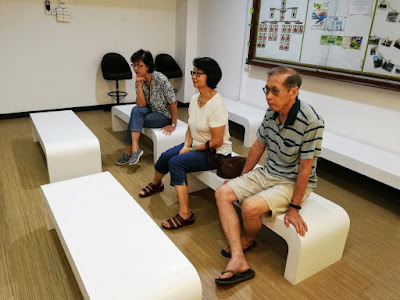It is disheartening that even after 62 years of Malaya's independence and 56 years since the formation of Malaysia, there are still individuals - disturbingly, even among the educated - who cling to the notion that Malaysia belongs exclusively to a particular race. They view the minorities who migrated from China and India before independence as outsiders or foreigners. What is most troubling is that the Prime Minister of the day described such extreme view as "balanced"! (
Read here).
During the 19th century, when Sabah (then North Borneo) was under British colonial rule, there was a pressing need for labourers, agriculturists, timber workers, and others to help develop the land. I believe it was in response to this call for manpower and opportunity that my paternal great-grandfather came to Sabah.
My grandfather was just a teenager when he left China and journeyed to Sabah with his father in early 1900s. I never knew my great-grandfather, Lee Kon Hee, as he passed away long before I was born. I was told he was buried at the Basel Christian Church Cemetery in Beaufort, though I have yet to locate his grave.
My great-grandfather, along with my grandfather Lee Thau Lim, his wife Chu En Lan, their two children (a son and a daughter), and other members of the clan, first settled in Beaufort. My grandfather likely took part in opening land for rubber plantations and worked as a rubber tapper. Sadly, in 1937, his wife passed away at a young age when my father was only 10. It was said that she was killed in an accident - possibly during a tree-felling operation, when a tree fell on her. My grandfather never spoke about the tragedy, which must have been deeply traumatic to him. Whether it was due to his enduring love for his wife or other personal reasons, he remained single for the rest of his life until his passing in 1968 - 31 years later.



I located my grandmother's grave when I visited the Basel Christian Church Cemetery in Beaufort on 23 March 2016. Her tombstone, which had been refurbished, was erected by my father in 1994.
*****************************************************
It's possible that, as a result of the accident, my grandfather decided to move his family to Sapong, located in the interior of what was then North Borneo. Sapong was well known for its coffee plantations, and it was likely his employment there that sustained the family for several years. Eventually, around 1947 or 1948, he and his son relocated to Kota Kinabalu (then known as Jesselton).
Upon arriving in KK, they rented a small plot of land from the Voo family in a quiet valley near what is now Jalan Istana (formerly Harrintgon Road). There, they built a modest timber house with an attap roof, marking the beginning of their new life in the city. A separate single-room annex was constructed beside the main house specifically for my grandfather's use. (
Read here).
Not long after settling in, my father entered into an arranged marriage with my mother and began working as a trainee tailor at a shop called Chu Chu Tailor on Gaya Street.
To earn some extra income, my grandfather took up ice cream peddling around the small town of KK and its surrounding neighbourhoods. Balancing a carrying pole on his shoulders, he would hang a cylindrical container filled with ice cream on one end, and on the other end, a basket holding ice cream cones and a small stool. As he walked through the town, he would ring a small bell to attract children - his main customers. School gates were among his most popular stops, often drawing eager crowds.
By nightfall, after selling most of the ice cream, he would make his way home. On some days, a small amount of unsold ice cream remained at the bottom of the container. Those evenings were a special treats for the grandchildren, who gathered with joy to enjoy every last scoop scrapped from the bottom - a sweet reward and cherished memory from simpler times.
 |
| Typical peddler in the 1950s. |
 |
Family photo, like taken in 1967 with my grandfather seated in the front row. My father and my mother are at the back row, 2nd and 3rd from right. |
More than 110 years have passed since the arrival of the first immigrants in my family, and we are now into the sixth generation born and raised in this country. Yet, it is both absurd and deeply offensive that newer generations of Malaysians of Chinese descent continue to be labelled as "immigrants". This notion becomes even more nonsensical when considering those of Chinese heritage who have intermarried with local indigenous communities, further cementing their roots in this land. Such labelling not only disregards our shared history and contributions, but also undermines the spirit of unity that Malaysia aspires to uphold.

























































